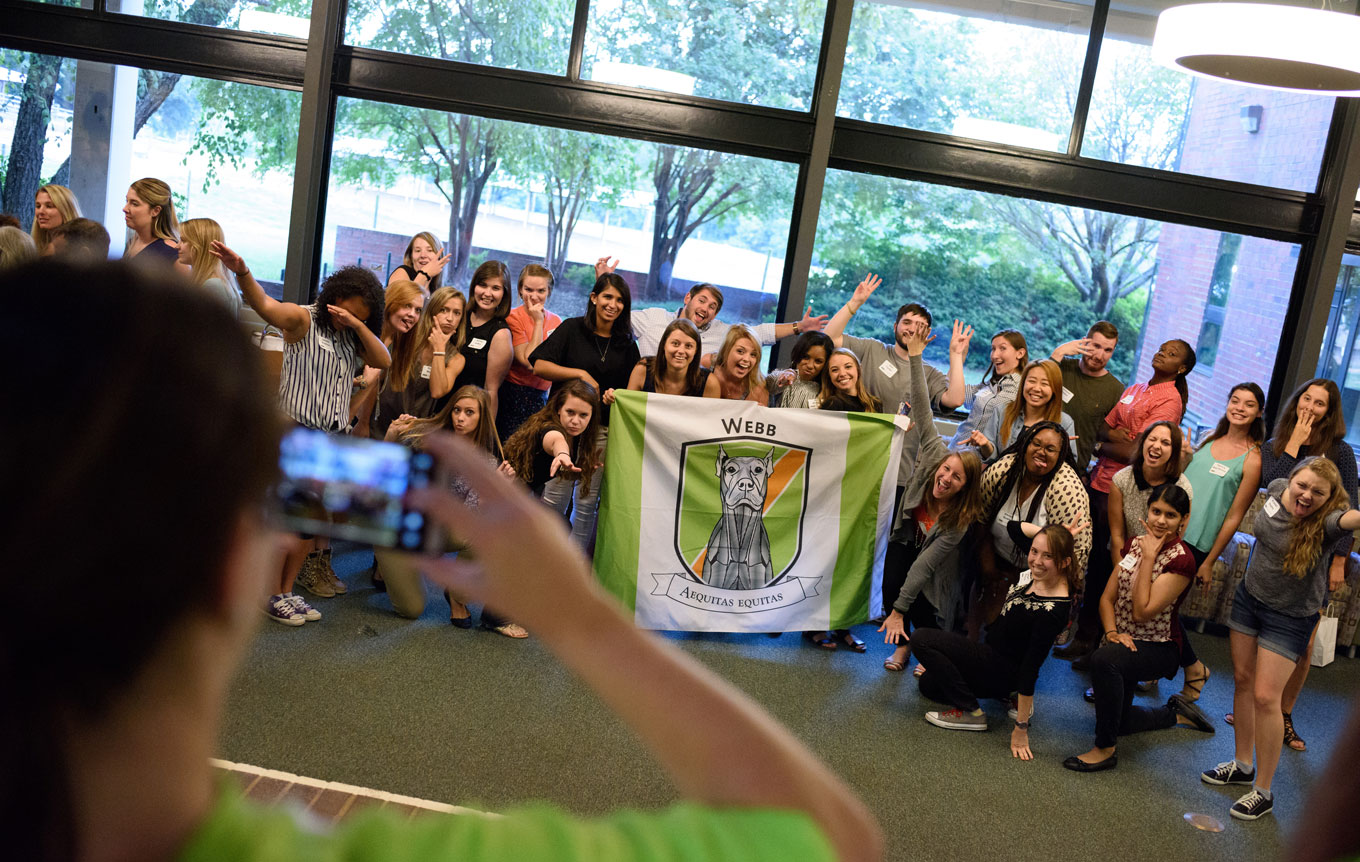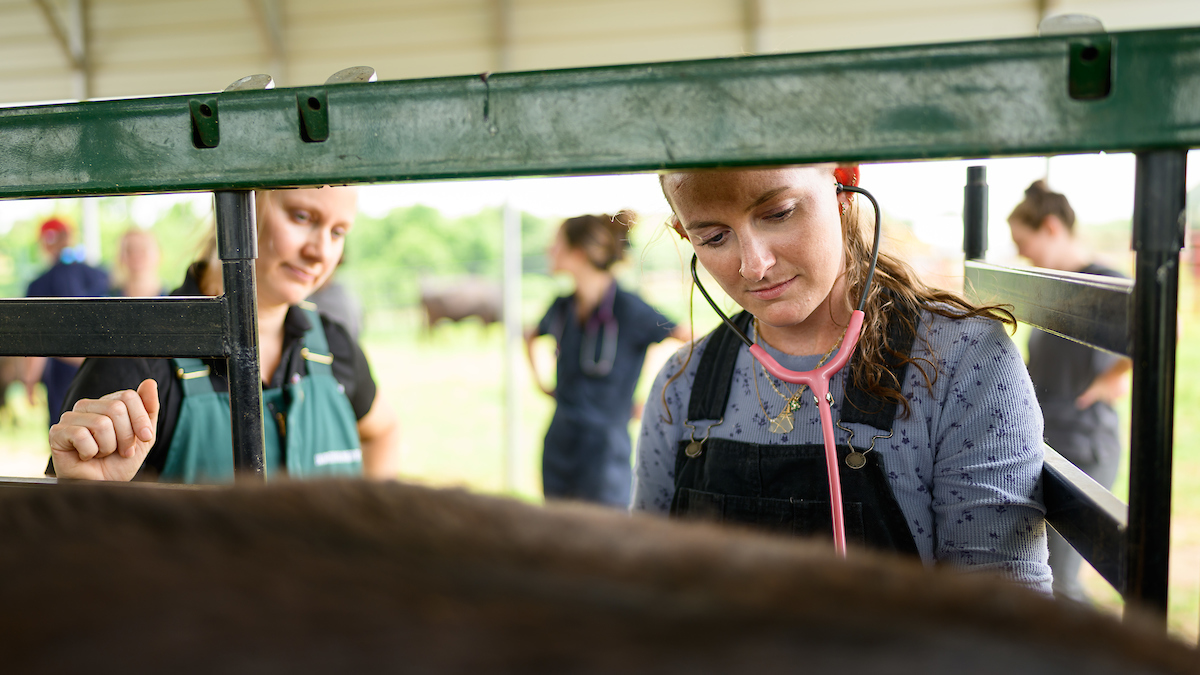At the CVM, a House System United

The feeling hit Sahar Sheikh-Ahmad during the first day of orientation, and by the second day she was sure of it. This, she thought, is going to be great.
As part of the Class of 2020, Sheikh-Ahmad started her NC State College of Veterinary experience unlike any student who came before. Her class was the first to take part in CVM’s new house system. That first day, during a sorting ceremony, she entered House Webb with 24 others from her class.
She was given a T-shirt with her new house colors, green and gold. Her house crest sported an anatomical portrait of dog, symbolizing her house’s namesake, Alfreda Johnson Webb, a revered veterinarian who helped plan the CVM and who was a devoted professor of anatomy, animal science and biology. The dog, Sheikh-Ahmad learned, also reflected some of the ideals of the house: faithfulness, loyalty, honor.
The second day of orientation, the Class of 2020 returned to campus wearing their T-shirts representing the system’s four houses. To Sheikh-Ahmad, the 99 other Class of 2020 members no longer felt quite like strangers. They were beginning to feel more like family.
“It just was good to know that these people in our house, and our entire class, were so inviting. We were already sharing this wonderful experience,” she said. “I knew that I was going to be OK.”
In the fall of 2016, the CVM became the first veterinary school in the country to implement a house system. It’s part open-arms welcome, part community builder and support system — and altogether a committed focus on physical, social and mental well-being.
And it’s uniquely CVM. The four houses named after impactful veterinarians — House Bourgelat, House Salmon, House Shalihotra, House Webb — compete throughout the year by earning points, a la the world of Harry Potter’s Hogwarts. Points are earned by taking part in a slew of activities fitting into five general categories: cultural, intellectual, physical health, social and mental/emotional wellness. At the end of the academic year, the house with the most points takes home the House Cup.
The competitive aspect is a motivator, but there’s more to the house system under the surface.

Right away, it helps first-year students quickly connect with those in other classes, those with a veterinary focus different from their own and faculty and staff they normally wouldn’t have likely met until their third or fourth years in school.
“It gives a sense of community that people really need to thrive,” said Sheik-Ahmad, who will serve as House Webb president in the fall. “In undergrad, you’re in a sea of people and you really mostly do it on your own. You can’t do that here. You need to have a system that’s supporting you throughout the entire journey. I feel like the house system can do that for a lot of people.”
More than 700 on campus are enrolled in a house; it’s open to everyone. That includes about 97 percent of doctor of veterinary medicine students, more than half of faculty and a third of staff. Every new class at the CVM is now sorted into the houses during orientation.
“Having a school that cares about your wellness, that has events that try to decrease the stress, made me feel more comfortable when I came here,” said Josh Zlotnick, Class of 2020
The house system has long been popular in the United Kingdom, where it is the norm in secondary education. In America, house systems were previously limited to a handful of human medical schools, used primarily to foster mentoring.
The CVM expands the scope of what a house system can do — and what it can offer veterinary students. The main goal was connecting people on campus outside of the classroom, said Luke Borst, associate professor of veterinary anatomic pathology, one of the many faculty and staff members that led the effort to launch the CVM’s house system.
“People want community,” said Borst. “In our society today, people are kind of isolated in their own little worlds, on their own little phones,” he said. “It’s a high-stress environment and you want that support. You want something you can all do together. I think that’s why it really works.”
It’s also fun. Students earn points for attending an after-school Harry Potter trivia contest or volunteering during Dog Olympics. In any given month, the opportunities include knitting during a regular “Wellness Wednesday” event and practicing yoga on the CVM’s front lawn. And then students can also earn points by going to panel discussions of rural veterinary practices, hearing a speaker during Latinx Heritage Month and participating in a roundtable discussion on LGBTQ student experiences.

“Having a school that cares about your wellness, that has events that try to decrease the stress, made me feel more comfortable when I came here,” said the Class of 2020’s Josh Zlotnick, president of House Webb. “I told myself that I want to have a family feeling at vet school. I want to feel like I can be myself, and the house system supports that.”
The system has also helped Zlotnick make academic connections. Through House Webb he connected with Christopher Mariani, of the house’s faculty advisors and associate professor of neurology. Mariani became Zlotnick’s summer research mentor last year.
Zlotnick and Sheikh-Ahmad said the house system has helped alleviate the nerves and stress associated with coming to a new, academically demanding school. Every now and then, House Webb meets and doesn’t talk about school. They plan social gatherings. They organized a gift exchange during Christmas. Those in House Webb have taken so much pride in their house colors that they ordered scarves of gold and green.
“The little things do help,” said Zlotnick. “If you don’t have these things, it seems like all you have, at times, is work and stress.”

Kate Bailey has one of those House Webb scarves hanging on her office door. The clinical assistant professor of anesthesiology is the house’s other faculty adviser and a 2009 CVM alum.
She said the success of the program comes from the drive of students. They are the ones, she said, who are organizing house meetings and planning events. They have embraced it.
“NC State is one of the most friendly, welcoming, collegial universities in the country,” said Bailey. “If you look at how many people have jumped on board to join this system, it speaks volumes about how much we actually enjoy each other’s company and how much we enjoy being a part of this place.”
Having a support system, said Bailey, is one of the keys to success at the CVM. The difference between undergraduate and vet school work can be staggering, Bailey said. Starting right away in the first year, the classes and work are unlike anything students have done before.
The house system helps students easily become a part of group that’s not just helpful, but uplifting.
“The students here are extremely smart. They are the top of the heap, that’s how they got here,” said Bailey. “But this is a ‘together’ struggle. They are in the trenches together. The same thing is happening to a whole group of people. The house system helps make it clear that no one is going through this struggle alone.”
Being a part of House Webb has helped Sheikh-Ahmad in another way. Usually more on the reserved side, she had never before held a student leadership position before coming to the CVM. The house system, she said, made her feel braver about leaving a lasting mark.
“I saw that the system would change a lot of student experiences here,” she said. “I wanted to help mold the system and create new things. It just really inspired me.”
~Jordan Bartel/NC State Veterinary Medicine
- Categories:


